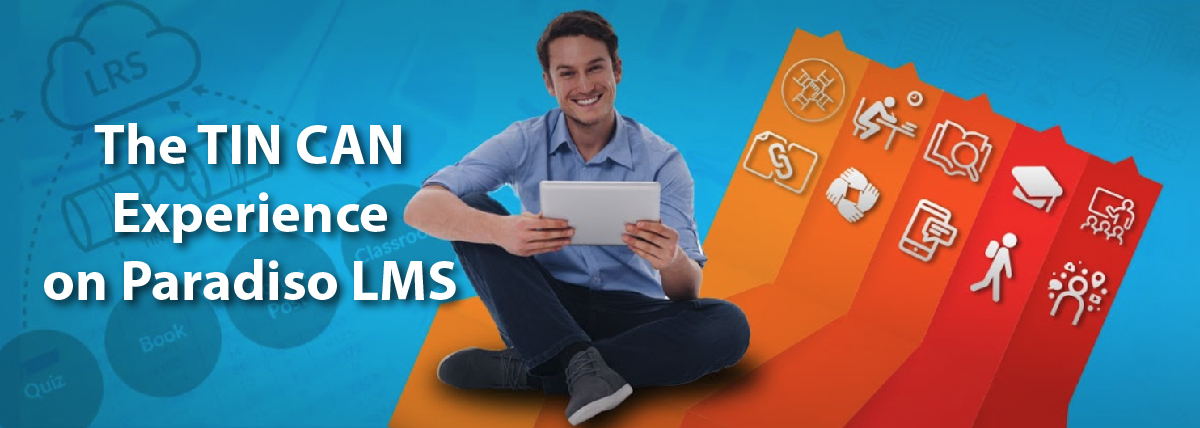Here’s a guide on how the TIN CAN feature works, how it integrates with LMS, the main benefits for the platform and for users on any corner of the process trainer/trainee!
So, what is TIN CAN?
The software industry is characterized for its fastness, there are many improvements taken out to the market constantly with the objective to deliver a better experience for users in all matters of the system managing and interaction.
For Learning Management Systems, the fact that users get an Optimus functionality is especially important in the way that the training or learning process acquires the best possible quality and constantly adapt to the new educational trends and that‘s precisely what TIN CAN have achieved.
 It can track almost any activity created for the trainee in order to accomplish a course. Let’s say, for example, that a course needs to get feedback from blogs, video or even magazines not included in the regular theoric content and out the LMS. Tin Can make it possible to get a record from that activity, surpassing the scope of its predecessor, the SCORM.
It can track almost any activity created for the trainee in order to accomplish a course. Let’s say, for example, that a course needs to get feedback from blogs, video or even magazines not included in the regular theoric content and out the LMS. Tin Can make it possible to get a record from that activity, surpassing the scope of its predecessor, the SCORM.
TinCan is a Learning Record System (LRS) that has the ability to give a really detailed vision of the learning activities both offline and online. It follows apprenticeship processes from reading a website, attending an event, borrowing a book, playing a video game, blended learning or team learning.
Data is compiled by statements, making very smooth the way that the learning path gets recorded thanks to three elements called “Tin Can’s Syntax”. The app works by assigning a “noun” for the subject carrying out the process, a “verb” for the action that he makes and an “object” as the matter to be discussed.
With this API, different systems can communicate with each other and interact with multiple technologies and content. TIN CAN developers worked on taking out all the pain that came with importing third-party content to the LMS.
The LMS integration
 Before TIN CAN, one of SCORM’s main goals was the “Shareable” part of the standard, but it was pretty much limited in that matter. That problem was solved with the arrival of Tin Can, it’s flexibility makes it a very useful tool that adapts to the diverse ways in which apprentices access knowledge and allows this process to take part in any place. The ability to track individualized learning using technology is called “quantified learner”.
Before TIN CAN, one of SCORM’s main goals was the “Shareable” part of the standard, but it was pretty much limited in that matter. That problem was solved with the arrival of Tin Can, it’s flexibility makes it a very useful tool that adapts to the diverse ways in which apprentices access knowledge and allows this process to take part in any place. The ability to track individualized learning using technology is called “quantified learner”.
It has importance for a trainer or a company because learning experiences can be analyzed and then compare what the trainee knows vs what he needs to learn, helping to define clear learning goals.
Tin Can API offers a series of interactions and improvements, taking to another level the learning experience. Some of them are:
- Having a path of the learning plans and objectives
- Safeties and solidity
- Integrates e-learning with mobile devices
- E-learning based on teams
- Takes out e-learning off its limits, pulling it out from the web. The API provides the chance to alternate between mobile and desktop devices so you can start a learning process in a cell phone or tablet, for example, and end it up on your desktop computer.
- Monitoring of real-time operation
- Allows mayor control above the learning contents and processes (generate scores, controls attempts, and progress)
- Delivers and easier and smoother way to learn thanks to the gamification feature
Paradiso’s LMS is Tin Can compliant, among others, so take the chance to start with our Learning Management System and be part of the next generation of SCORM.


 It can track almost any activity created for the trainee in order to accomplish a course. Let’s say, for example, that a course needs to get feedback from blogs, video or even magazines not included in the regular theoric content and out the LMS. Tin Can make it possible to get a record from that activity, surpassing the scope of its predecessor, the SCORM.
It can track almost any activity created for the trainee in order to accomplish a course. Let’s say, for example, that a course needs to get feedback from blogs, video or even magazines not included in the regular theoric content and out the LMS. Tin Can make it possible to get a record from that activity, surpassing the scope of its predecessor, the SCORM. Before TIN CAN, one of SCORM’s main goals was the “Shareable” part of the standard, but it was pretty much limited in that matter. That problem was solved with the arrival of Tin Can, it’s flexibility makes it a very useful tool that adapts to the diverse
Before TIN CAN, one of SCORM’s main goals was the “Shareable” part of the standard, but it was pretty much limited in that matter. That problem was solved with the arrival of Tin Can, it’s flexibility makes it a very useful tool that adapts to the diverse 














